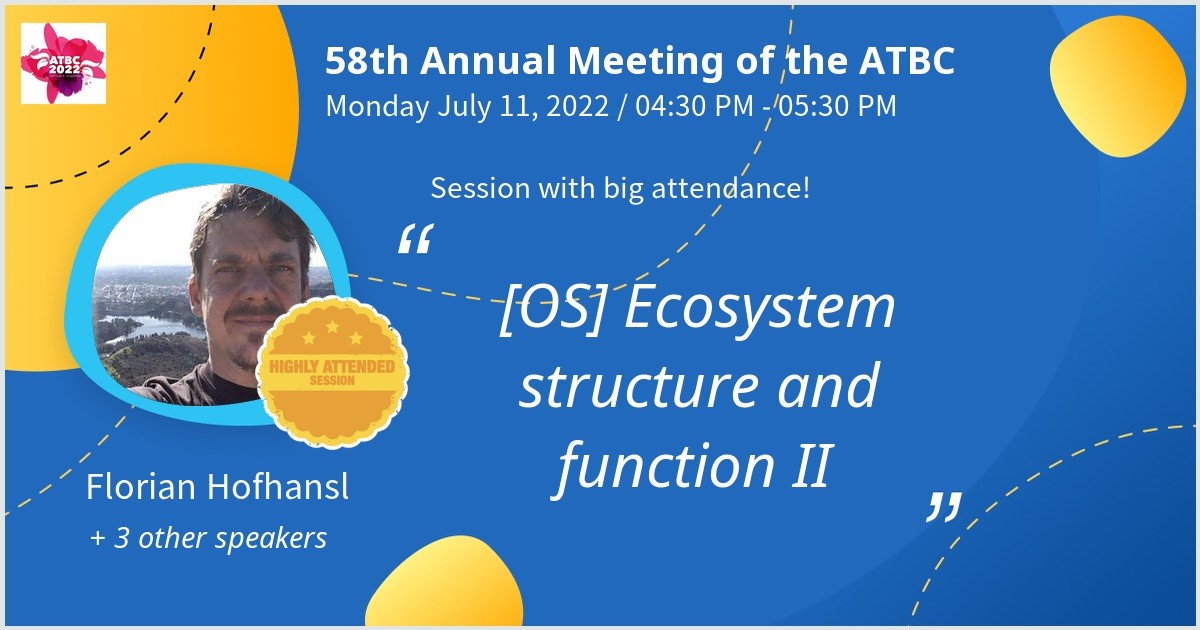
Florian Hofhansl writes about an upcoming IIASA research initiative and its successful inauguration at a recent conference of the Association for Tropical Biology and Conservation.
Although many scientific frontiers have been surmounted during the 60 years of the Association for Tropical Biology and Conservation (ATBC)’s existence, the topic of this year’s 58th conference, Conserving Tropical Biodiversity and Achieving Socio-Ecological Resilience in the Anthropocene: Opportunities and Challenges, highlights that the academic community still needs to approach ongoing challenges of biodiversity conservation and restoration.
During this year’s edition I had the pleasure of giving a talk during one of the sessions receiving special attention as a “Session with big attendance". Our presentation addressed the challenges and opportunities of applying a multi-disciplinary systems-thinking approach by integrating scientific evidence on key ecosystem processes affecting ecosystem resilience to climate change with socioeconomic aspects driving stakeholder decision-making on local land use.
 © IIASA
© IIASA
While in future scenarios climate change is usually considered the role of social actors – in other words, individuals or entities such as political parties and social movements that drive change in a society – institutions as drivers of change often lack integration. However, since both natural and anthropogenic (man-made) factors determine the rate of socio-ecological resilience to climate change, we advocate for the creation of a methods toolkit that explicitly considers procedural and distributional justice under future climate change scenarios and therefore captures both natural and socioeconomic aspects in a multidisciplinary co-production process.
One such initiative is currently running under the auspices of the IIASA Strategic Initiatives Program, and aims to understand issues of fairness when managing risks at the food-water-biodiversity nexus across a watershed located in the Bhima basin, India. To achieve this goal, the fairSTREAM project aligns the expertise of researchers working across different IIASA research groups, including the Equity and Justice, Water Security, and Biodiversity, Ecology, and Conservation research groups, thereby capturing different scientific fields that integrate quantitative modeling with co-designing participatory processes.
Another recently selected IIASA Strategic Initiative project will be assessing the Resilience of Ecosystem Services provided by Intact and Sustainably managed Terrestrial ecosystems (RESIST). RESIST will further extend the systems analysis framework designed by the fairSTREAM project by integrating a recently developed eco-evolutionary vegetation model with existing IIASA models. This coupled framework will allow us to assess the linkages between biodiversity and ecosystem functioning, while at the same time accounting for stakeholder views on ecosystem services, environmental change, and biodiversity loss. Our goal is to create sustainable management scenarios by engaging in active dialogue with stakeholders on specific case studies that will be conducted in close collaboration with IIASA Member Organizations.
First, we will build upon stakeholder interests in the Bhimashankar region in India, identified by the fairSTREAM project, and use the results to establish parameters for the proposed modeling framework, which will allow us to assess both natural and man-made aspects driving ecosystem degradation with the goal of identifying sustainable management recommendations that foster long-term resilience of both natural and intensified ecosystems.
Second, we will expand our framework to capture below-ground dynamics, such as plant rooting strategies and resource allocation in response to droughts by integrating on site measurement data available for forest stands across a natural drought gradient in Israel.
Lastly, we aim to apply a regional climate model (in collaboration with the Met Office, UK) to investigate the impact of intact versus degraded forests in the Brazilian Amazon on the cycling of atmospheric moisture, which has been shown to crucially affect regional water transport and therefore might limit water availability in the intensified agricultural production region of the South American breadbasket.
To learn more about our project please visit the RESIST project website.
Principal Investigator (PI): Florian Hofhansl, Biodiversity and Natural Resources Program, Biodiversity, Ecology, and Conservation Research Group.
Note: This article gives the views of the author, and not the position of the Nexus blog, nor of the International Institute for Applied Systems Analysis.